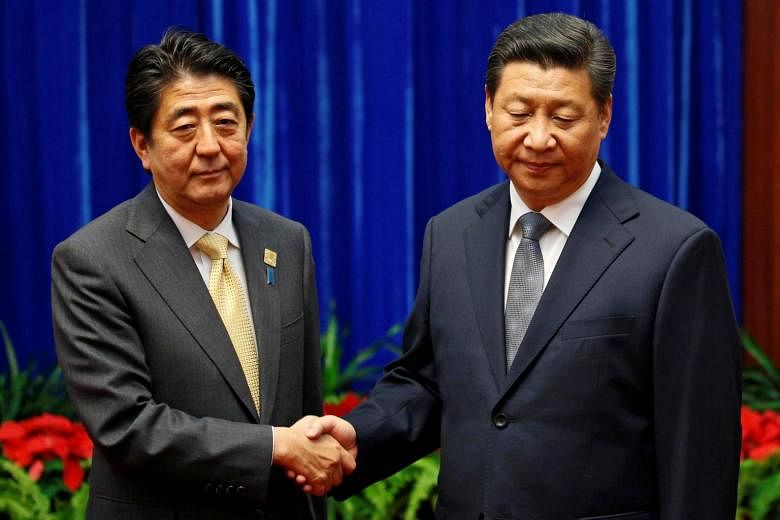In its editorial on Nov 6, the Yomiuri Shimbun encourages leaders of Japan and China to discuss ways to better relations when they meet in Vietnam.
TOKYO (THE YOMIURI SHIMBUN/ASIA NEWS NETWORK) - As the leaders of both Japan and China have bolstered their respective power bases almost simultaneously, it is indispensable for them to demonstrate leadership in order to improve bilateral relations.
Thanks to his Liberal Democratic Party's (LDP's) landslide victory in the House of Representatives election, Prime Minister Shinzo Abe has resolidified the base for his long-term administration. Chinese President Xi Jinping also boosted his authority at the National Congress of the Communist Party of China.
Shortly afterward, senior officials of both countries in charge of foreign affairs and defence held the Japan-China security dialogue. Yet they failed to reach an agreement on the implementation of the Maritime and Aerial Communication Mechanism, which is designed to avoid an accidental clash in the East China Sea.
There have already been 15 sessions of the security dialogue. Amid the absence of any strong political will to escape the stagnant condition of bilateral relations, there seems to be limitations to the potential results, even if working-level talks continue.
Abe and Xi will soon hold talks in Vietnam, where the summit meeting of the Asia-Pacific Economic Cooperation (Apec) forum is scheduled to be held. Both should promote an easing of tensions, reaffirming the importance of creating a system to avert an unforeseen incident.
Amid the increasingly tense North Korean situation, it is problematic that the leaders of the two countries have no forum for regular talks. Reciprocal visits to each other's countries by Abe and Xi should become a reality, by realising Chinese Premier Li Keqiang's first visit to Japan within this year through his attendance at a trilateral summit of Japan, China and South Korea.
In China, the fact that the authority of its foreign ministry is less than that of the Communist Party or the military has been a restraining factor for its diplomacy toward Japan.
In the personnel reshuffle for Xi's second term in office, State Councillor Yang Jiechi was promoted to membership in the Politburo, the first time in 15 years that a former diplomat has been elevated to the nerve center of the party. There is even speculation that he may become vice premier in March. It is hoped that Yang will make use of his experience in bilateral negotiations with Japan and his personal connections, thus promoting constructive dialogue.
As China's economic growth slows down, Xi is trying to find a way out with the "One Belt, One Road" mega economic zone project, stretching from China to Europe, as well as to Africa. Abe has shown a certain degree of cooperative stance toward the project. There may be some room for Japan and China to cooperate with each other.
Among the neighbouring countries of China, there is also strong wariness regarding the project, with fears that it may lead to China reinforcing its military facilities and building up an exclusive sphere of influence. China must recognise that it will be difficult to expect stable development of the project as long as China tries to expand its interests while ignoring the rule of law.
By utilising its experience in extending assistance to developing countries, Japan must continue stressing to China the importance of considering the development of its partner countries and regions.
Xi is aiming to make China a military and economic power, equal to that of the United States, which is a superpower. His strategy seems to take the initiative in the order of the Asia-Pacific region led by both the United States and China.
The Japan-U.S. alliance has underpinned the regional peace and prosperity of Asia. Abe must state this clearly once again during his talks with U.S. President Donald Trump on Monday.
The Yomiuri Shimbun is a member of The Straits Times media partner Asia News Network, an alliance of 23 news media entities.

